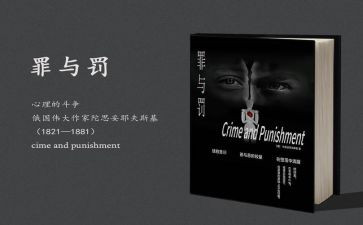罪与罚英语读后感优质5篇
书写一篇读后感可以强化大家对书上理论的认识,读书对我们有方方面面的好处,通过写作读后感,可以让我们的阅读变得更有价值,下面是尚华范文网小编为您分享的罪与罚英语读后感优质5篇,感谢您的参阅。

罪与罚英语读后感篇1
recently, i have reading the book "jane eyre”。 although i forgot some details in the book, jane gave me deeply impression, i admire her very much. after that the teacher also told us to put the play in to a movie, and then we all can touch each hero’s soul in the book. the play it mainly tell us how jane is growing up when suffering from great difficulties and painless. whats more, it is impressed me that she still love her master even if he is blind at last due to rescue his mad wife.
and i like the classic lines what jane said to mr. rochester :"do you think i can stay to become nothing to you? do you think i am an automaton?--a machine without feelings? and can bear to have my morsel of bread snatched from my lips, and my drop of living water dashed from my cup? do you think, because i am poor, obscure, plain, and little, i am soulless and heartless? you think wrong!--i have as much soul as you,--and full as much heart! and if god had gifted me with some beauty and much wealth, i should have made it as hard for you to leave me, as it is now for me to leave you.
i am not talking to you now through the medium of custom, conventionalities, nor even of mortal flesh;--it is my spirit that addresses your spirit; just as if both had passed through the grave, and we stood at gods feet, equal,--as we are!" its so beautiful, jane is a girl who will never lose confidence in life and always sensible when handling with some motional problems. jane was huge in my heart. she can control her life and fate. she knew how to continue her life and she got it!
maybe after what she told me i have known that what love is and how to love and to be loved! the book is a book worth of reading, so all in all let’s enjoy it!
罪与罚英语读后感篇2
陶行知先生是我国近代最具有影响力的教育家、教育思想家。他也是最具有批评精神和创造精神的教育开拓者。他博大的教育思想,求真的教育实践,行知合一的师德风范为我们树立了光辉的榜样,不愧为是“伟大的人民教育家”,“万世师表”。
“生活教育理论”是陶行知先生教育思想的主线和重要基石,它的精神内含十分明确,即大众教育——为了人民的解放、人民生活的幸福。
“千教万教教人求真,千学万学学做真人。”陶行知先生这一至理格言,这是我们“教书育人”的永恒主题。
“捧着一颗心来,不带半根草去。”这是陶行知先生的座右铭,也是他一生献身人民教育事业,寻求探索中国教育之光明大道的生动写照。他认为教师应“发前人所未发,明今人所未明”,提倡教师做一个学生思想和求知的引路人,不做一个教书匠。
“人生天地间,各自有秉赋,为一大事来,做一大事去。”这是陶行知先生作的《自勉并勉同志》诗。他自己的一生正是不断追求真理,学做真人的典范。陶行知先生的教育思想与实践,为我们留下了一份宝贵的精神财富。我们要学习他高尚的道德情操,研究他丰富的教育遗产,以全面提高自身素质,使自己成为心灵世界的开拓者,智慧田野的播种者,人类文明的传递者。面对教育的改革,新课程、新理念,每一个教育人都应该冷静地思考自己的教育、教学行为,我们的办学行为。负责地对每一个孩子的一生负责,为孩子的成长、为孩子的发展,认真履行教师的职责。
一、实施爱的教育
“捧着一颗心来,不带半根草去”,这是我国著名教育家陶行知先生毕生从事教育事业的真实写照。爱的教育是教育的基本原则和方法。陶行知先生的“爱满天下”更把爱的教育发扬光大。教师对学生的爱在教育中具有重要的作用。教师对后进生应有要有一颗爱心,它不埋在胸膛里,而应擎在手上,高高举起,让学生看得见,摸得着,时时感觉到。老师对后一进生更要倾注真诚的爱心,使学生感到老师的亲切、集体的温暖,从而树起生活的信心,提高学习的积极性。
在爱的教育中,培养学生爱的情感,用爱的情感帮助学生塑造人格。如开展“我与父母通信”活动,使学生们感受父母的爱,从而培养学生爱父母、爱他人的情感。情感是理智的基础,善良的心和爱他人、爱祖国的情操也是创新智慧的心理基础。
二、实施生活教育
陶行知生活教育理论内涵十分深广,而生活教育理论是陶行知教育思想的.主线和重要基石。陶行知提倡生活就是教育,就是教育的内容。他的生活教育从内容上看是动态的,随环境和不同受教育者的变化而变化。在生活里找教育,为生活而教育”的观念相当明确。根据陶行知先生的“教学做合一”的理论“教的法子根据学的法子:学的法子根据做的法子。事怎么做.就怎么学,就怎么教”,而教学的中心是“做”即实际生活。
三、实践创新教育
创新教育是教育观念,又是具体的教学思想,它只有化作具体的教育教学的操作方法才能够实现。但教育教学无定法,因此它又是一个长期的实践过程。为此,今后我更要认真学习陶行知教育思想与现代教育思想,更新教育观念,牢固树立以素质教育为核心的基础教育主流价值体系观念,提高实施素质教育的自觉性。以陶行知先生为楷模,学习他高尚的人格品质,求真求实求创造的教育理念,成为敬业爱岗、师德高尚、业务精良、创新务实的教师,为培养学生成为“真人”,并具有创新精神与创造能力的一代新人而努力工作。
陶行知教育思想是宝贵的经验和财富,是我们学习、研究、继承和发展的永恒的课题,是创造型教师及专业发展义不容辞的责任。
罪与罚英语读后感篇3
读了《柳林风声》这本书,着实让我感动了一把。作者让我们感受到的是柳树林里那些让人羡慕的田园风光,还有老獾、水老鼠、鼹鼠、癞蛤蟆等朋友们的友谊的故事。
?柳林风声》主要是讲述了柳树林中的动物们的故事。柳树林中老练的獾,他虽然很少露面,却在树林里是一个极有影响力的人物。本性敦厚、善良的水老鼠他愿意与朋友分享他的所有,并且极富同情心。鼹鼠是一个任劳任怨愿意帮忙人并且肯动脑筋的家伙,他总是悄悄的为大伙做事,并且总是以进取的态度应对生活。傲慢的癞蛤蟆靠着富裕的祖传家产,挥霍浪费,连自我的家都没有了。最终,在他的三个好朋友帮忙下他把家产夺了回来,癞蛤蟆也不再挥霍浪费且骄傲自大了,变得十分谦逊。
这篇文章把我们带到了这个无边无际的柳树林,而我们就好似这树林里的居民,能够感受老成持重的獾,善良敦厚的水老鼠,任劳任怨的鼹鼠,还有放浪不羁的蛤蟆。但唯一不一样的是,这个树林里少了点什么东西,实际上又让我们感受到了些什么,细细品味我们就能够感受到那丝丝温暖而又悄然无息的东西,这就是友情。
这篇文章把我们带回到作者肯尼恩·格雷厄姆的世界里,感受到了英国式的和平安宁的乡村生活和温暖的家庭氛围,让我们随着这些可爱的动物们感受了泰晤士河岸的四季生活。通篇文章把家的气氛描述的详尽而又温馨,让我们在营造的家的氛围里再次感受到了细小温馨的爱的故事。
也许《柳林风声》本身的故事实际平淡无奇,但他却大胆的利用了童心、童趣以及家这几条主要线索,把这些点点滴滴的故事经过这些动物们在柳树林中的生活再现出来。实际上柳林就是柳树林,而风声就是这些动物们发生的一系列的故事所组成。
如此美妙、动人、趣味、温馨的作品,真是令人回到了童趣、童真的生活中去了,也许我们每个人都想感受一下柳树林中那一缕缕的“风声”!
罪与罚英语读后感篇4
叹人间美中不足今方信,满纸荒.唐言,一把辛酸泪。都云作者痴,谁解其中味。世事一场大梦,人生几度秋凉。
——题记
红楼梦一梦古往今来,赚得了多少叹息,多少惆怅,可是又有谁读懂了曹雪芹背后的凄凉 ,午夜梦回他是否会想起自己的年少,想起那大观园的喜怒哀乐,然后轻轻一声叹息,面上平静如初,实则内心百般波澜。
有友人问我,在这本书中 你认为曹雪芹更偏爱林黛玉还是薛宝钗?我轻笑不语,其实无论是黛玉还是宝钗都不过是那颗顽石命中的一片浮云,片刻间便烟消云散,干净的不留下一丝痕迹,无论当初发生了什么,都是对的,可如果一旦结束便真的是结束了。
都说红楼梦最著名的便是那一首“满纸荒.唐言,一把辛酸泪。都云作者痴,谁解其中味。”是呀!全书写的都是荒.唐的言辞,却浸透了作者辛酸的眼泪!都说作者迷恋儿女痴情,可又有谁能真正理解书中的意味?“荒.唐”不仅指作者在书中引出了“炼石补天”“青埂峰”等荒.唐故事,而是指出全书描写的当时社会的腐朽,残酷,互相倾轧以至于走向灭亡的道路。这书不仅是曹雪芹对而是生活的迫忆,更是对现实生活的不满和讽刺,“无材可去补苍天,枉入红尘若许年。此系身前身后事,倩谁记去作奇传。”作者借顽石说自己不能匡时济世,被弃置世间,半生潦倒,一事无成,所谓无才,貌似自惭,实则自负,是作者愤激之言,是一种“缚将奇士做诗人”的慷慨;以顽石为喻,表现自己不肯随世俗 同流合污的傲骨,作者把那块石头称为“顽石”也大有深意。顽石的特点便是棱角分明,执拗死硬,毫不通融。人如果具备这种品格就必然同当时那个黑暗卑劣的社会不相融,那这个社会就一定会排斥他。作者自己深深懂得他绝不是为了给世人消愁,解闷儿来写这部书的,而是把自己一生“历尽离合悲欢炎凉世态”的经历,加以艺术的概括和提炼。塑造了众多类型的人物,来表明他对人性和社会的认识,寄托他难以言语的感慨,既是赞歌,又是悲歌挽歌。
作者是以泪和墨写下这本书。作者担心他这部呕心沥血之作不被后人理解,预料到有人会嘲笑他愚痴。百年后世人对红楼梦可谓是褒贬不一,鲁迅先生说《红楼梦》:“单是命意,就因读者的眼光而有种.种:经学家看见《易》,道学家看见“淫”,才子看见缠绵,革命家看见排满,流言家看见宫闱秘事。”可是无论怎样,认识任何一个事物都必须要有辩证统一的眼光,坚持一分为二,两点论与重点论的统一。但《红楼梦》在中国乃至世界文学史上的地位是毋庸置疑的。
说到辛酸处,荒.唐愈可悲,由来同一梦,休笑世人痴。
罪与罚英语读后感篇5
during the summer vacation, i savored don quixote again.
the author of this book draws a caricature of the knight errant through themiserable experience of the mad don quixote. you see, it's the mill windmill,but he thinks it's a giant with three heads and six arms. so he urges the horsespear to rush away, but it's thrown to the ground and can't move. even so, whenthe servant sancho came to tell him again that it was not a giant but awindmill, he argued that it was the magician who turned the giant into awindmill. there are countless such actions, which are very funny and makereaders laugh again and again. the author combines the description of thecharacters of different social classes with the description of the socialreality, vividly reappears the domineering of the noble gentlemen and the upsand downs of the common people.
don quixote was a little squire who was fascinated by reading knights'novels all day. he imitated the ancient knights and went out to adventure anddid many ridiculous things. although he is crazy, he hates tyranny and crueltyand opposes oppression. you see, once, his horse was injured by a group ofporters. regardless of the other side's more than 20 people, he resolutelyfought with the other side and was finally knocked down to the ground. if i seemore than 20 men holding sticks, i'm sure i'm not brave enough to go out. i'lleither admit my misfortune or run away. and don quixote, knowing that the enemyis strong and we are weak, is still fighting for justice in the end. this spiritis really worth learning. don quixote is also very charitable, sympathizing withthe weak and upholding justice. once, he caught a wronged prisoner. in order tolet him go, he reconciled and beat him once, although at last many prisoners ranaway.
don quixote is a complex and contradictory man. he has some other badhabits. he thinks he's right and doesn't listen to others' advice. sangqiuadvised him not to cut down the windmill, but he didn't listen. at last, he waslifted up by the windmill and hurt. he was nervous again. when he saw a mancoming to him, he thought that the other side was going to fight him, so hekilled the other side with a knife.
the first time i read "don quixote", i wanted to laugh, and did ridiculousthings for don quixote. the second time i read it, i wanted to cry, for thedomineering of aristocratic gentlemen and the ups and downs of ordinary people.the third time will naturally think from these cries and smiles. so, what do youread from it? let's talk about it together!


